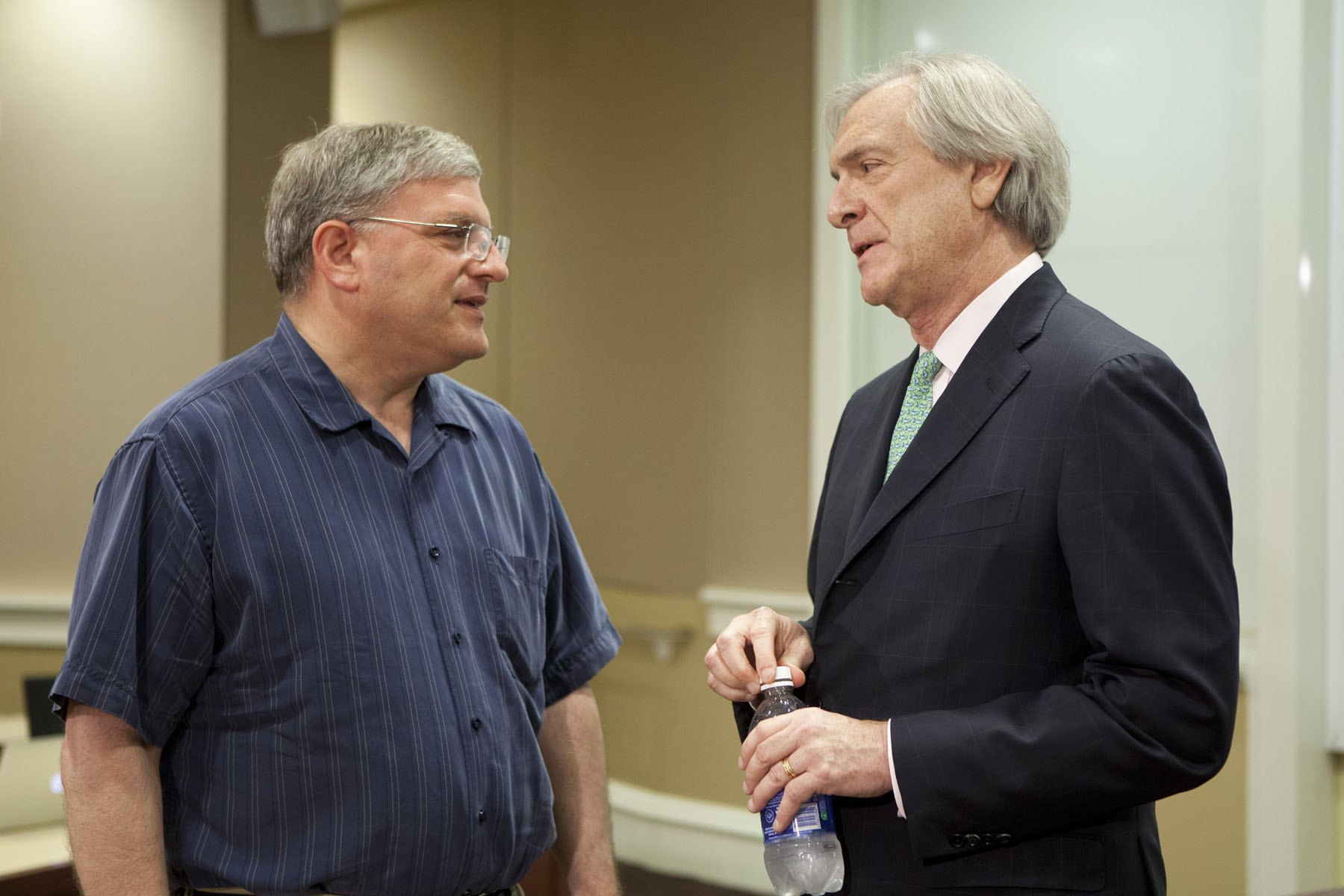McIntire School of Commerce Dean Carl P. Zeithaml said Friday that he believes all parts of the University of Virginia community – including those with opposing views on President A. Teresa Sullivan's resignation and efforts to reinstate her – are acting in what they passionately believe is the University's best interest.
"I understand right now that everybody is trying to do the right thing," Zeithaml said at a press conference where he explained his decision to step back as the designated interim president until Sullivan's future at the University is settled, possibly Tuesday at a special meeting of the Board of Visitors.
Also on Friday, Gov. Robert F. McDonnell issued a statement and sent a letter to the board demanding that they resolve the leadership crisis at Tuesday's meeting.
"If you fail to do so, I will ask for the resignation of the entire board on Wednesday," he wrote. "Regardless of your decision, I expect you to make a clear, detailed and unified statement on the future leadership of the University."
The board announced Sullivan's resignation June 10, with Rector Helen E. Dragas citing a desire to move more quickly on several areas of reform. The board voted Zeithaml as interim president early Tuesday morning after a marathon closed meeting. He was scheduled to take over Aug. 16.
Friday, he cited the groundswell of support for Sullivan's reinstatement as the motivation for his decision to suspend his preparations to serve as interim president. On Thursday, Zeithaml's fellow deans and other University leaders unanimously called for Sullivan's reinstatement. Shortly afterward, the board announced a meeting to discuss Sullivan's status. That 3 p.m. meeting is scheduled to be held in open session in the Rotunda, according to University officials.
"I think the challenge here is to balance the competing views of well-intentioned people," he said. "But I believe my role is to step back, let the decision be made, and then next Tuesday night or Wednesday decide what the appropriate role is for me, given the circumstances."
The Board of Visitors has been deluged with messages from the University community in recent days, both favoring and opposing their decision. On Friday afternoon, the U.Va. Alumni Association delivered to the Board of Visitors office 5,500 alumni responses gathered via a Web form.
Zeithaml said he's prepared regardless of how the board votes Tuesday.
"If the board decides to reinstate President Sullivan, I will be very happy to work with her," he said. "If the board decides not to reinstate the president and if they want me to be the interim president, then I will do what I can to help in whatever way I can for the University of Virginia to move forward."
Zeithaml said meetings with groups such as the Faculty Senate and the department chairs of the College of Arts & Sciences helped solidify his decision to step back, as did the announcement of the board's upcoming meeting.
The emerging popular narrative of Sullivan's removal as the result of a larger existential struggle between traditional academics and business-minded executives is overblown, he said.
"I sort of span both worlds," said Zeithaml, who holds an MBA and a doctorate of business administration. "I understand business and finance in the private sector, and I think I understand it in the university world.
"I think there are a lot of principles that could be applied from the private sector into our world here, but not all of them, and not in total."
More diversity in its membership would help the board make such determinations, he said. All 16 members of the board are appointed by the governor, with one non-voting student member.
"I absolutely believe that there should be faculty representation on the board," he said. "I think some staff representation on the board wouldn't be a bad idea. And what I'd really like to see – and we'd need to put a process together to figure out how to do this – but I'd love to see some of the board members not be political appointees."
This could result in the appointment of people who are experts in the problems higher education institutions face, he said.
Zeithaml said he hasn't been in contact with Sullivan, but he left her a message Thursday thanking her for a statement in which she asked for civil discourse and called Zeithaml "an exemplary member of the University community."
Zeithaml also said the board and Dragas needn't be vilified.
"Helen Dragas is not an evil person," he said. "She has given so many years of service to this University. She has two degrees from this University. I honestly believe that she thinks in her heart of hearts that the decision they made to ask President Sullivan to resign was the right thing. … It was a deeply flawed process and she realizes it now."
In his letter released Friday afternoon, McDonnell thanked the board members for their service but said the process by which they obtained Sullivan's resignation lacked transparency and explanation.
"The execution and communication of some of the decisions over the past 12 days has confused and angered people in the larger University community," he said.
He asked the board to eliminate any uncertainty about Sullivan's future; provide a clear explanation of whatever decision they make; and to make their determination without regard to political, personal or media pressure.
"Your decisions should be based solely on the best interests of the University," he wrote. "Members of the board are the only individuals who possess the complete information necessary to make important personnel decisions."
Finally, he told the board to unify when their deliberations are finished. "These past weeks of leaks to the media regarding closed sessions and vacillating positions are unacceptable," he wrote.
– by Rob Seal
Media Contact
Article Information
June 22, 2012
/content/zeithaml-steps-back-interim-president-elect-mcdonnell-demands-resolution

